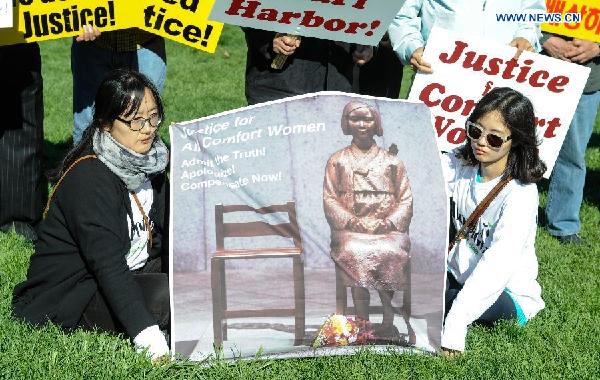Comfort women deal cannot erase victims' pain
- By Zhang Jingwei
 0 Comment(s)
0 Comment(s) Print
Print E-mail China.org.cn, January 7, 2016
E-mail China.org.cn, January 7, 2016
|
|
|
Protesters hold signs in front of Capitol Hill as Japanese Prime Minister Shinzo Abe pays a visit to White House in Washington D.C., capital of the United States, April 28, 2015. Nearly 200 people held signs and shouted slogans in a protest against Abe's handling of history issues, demanding the Japanese leader to unequivocally apologize for his country's wartime crimes here on Tuesday. (Xinhua file photo/Bao Dandan) |
Although not so satisfying, the justice deferred is a consolation. And it shows that the Japanese government is stepping towards the right direction in assessing its outlook on World War II. However, the agreed accord is actually based on securing interests rather than reviewing history.
"Japan and South Korea will welcome in a new era," Abe told reporters after speaking on the phone with Park. "Both countries will cooperate together to open it," he added.
Abe's words reflect the geopolitical reality in Northeast Asia. The United States-Japan-South Korea alliance is a foundation for the U.S.'s strategic layout in Northeast Asia, and even the entire western Pacific region. Disputes over the comfort women issue have been souring Japan-South Korea relations, which has pushed South Korea closer to China and generated a negative influence on the three countries' alliance, ultimately undermining the U.S. security interests.
The United States does not want to see Japan in conflict with South Korea, or China and South Korea becoming closer. Washington and Tokyo don't want to lose Seoul as an ally in Northeast Asia to contain Beijing, and Seoul wishes to strengthen its alliance with Tokyo and Washington to safeguard its security interests while seeking more economic cooperation with Beijing. Pushed forward by Washington, the reconciliation between Tokyo and Seoul is in the interests of every ally.
While the world is busy applauding the deal, another concern was raised: how can we solve the issue of Chinese comfort women? According to statistics, only 24 Chinese comfort women were still alive by October 2015, including four living in Taiwan.
Chinese comfort women adopted civil litigation in 1995, and in 2007 the Japanese Supreme Court acknowledged Japan's atrocities regarding the issue but refused to compensate as the statute of limitations had run out. Can the Tokyo-Seoul deal be served as a model? Let's wait and see.
Zhang Jingwei a researcher of the Charhar Institute.
This article was written in Chinese and translated by Fan Junmei.
Opinion articles reflect the views of their authors, not necessarily those of China.org.cn.




Go to Forum >>0 Comment(s)